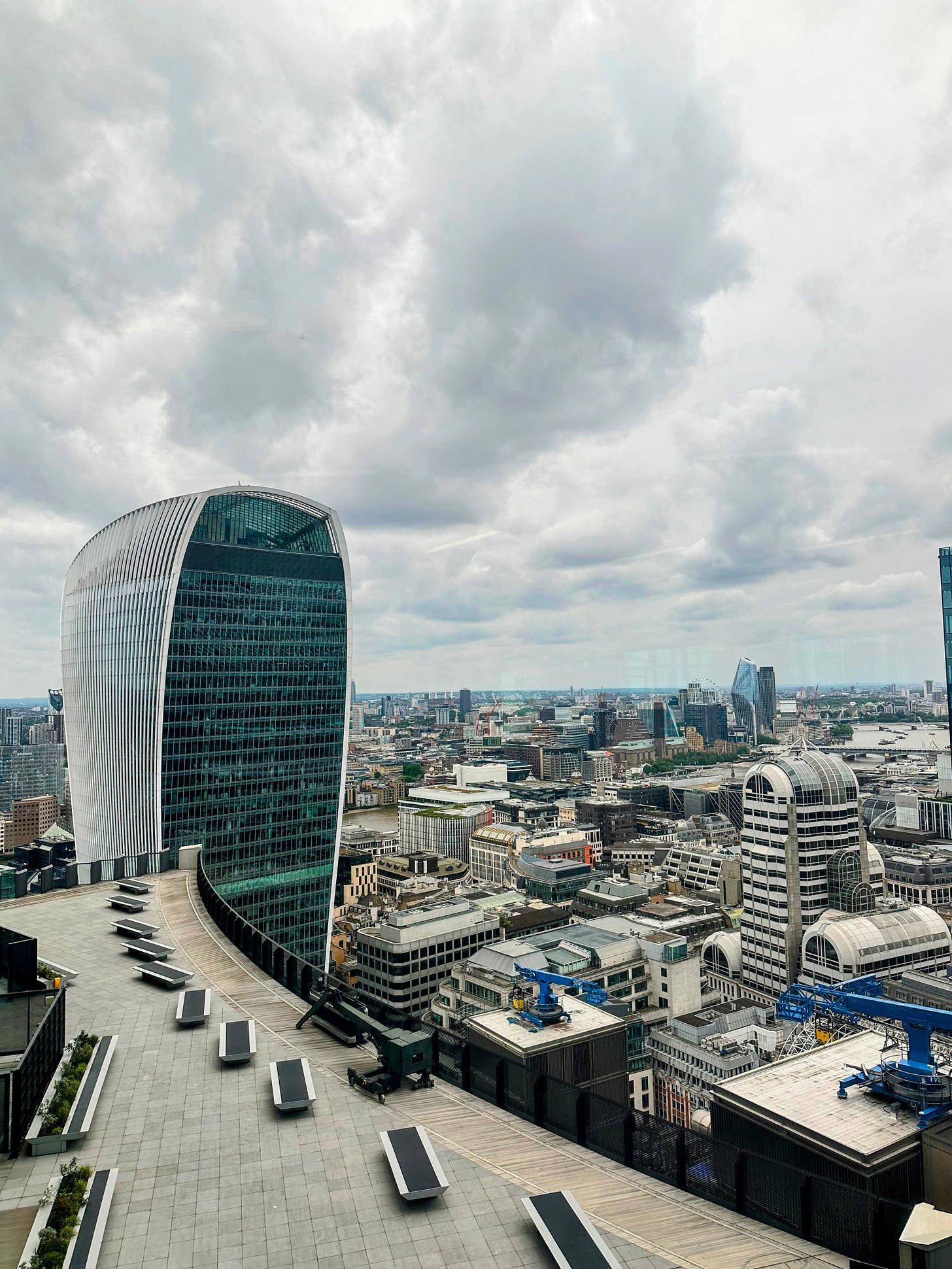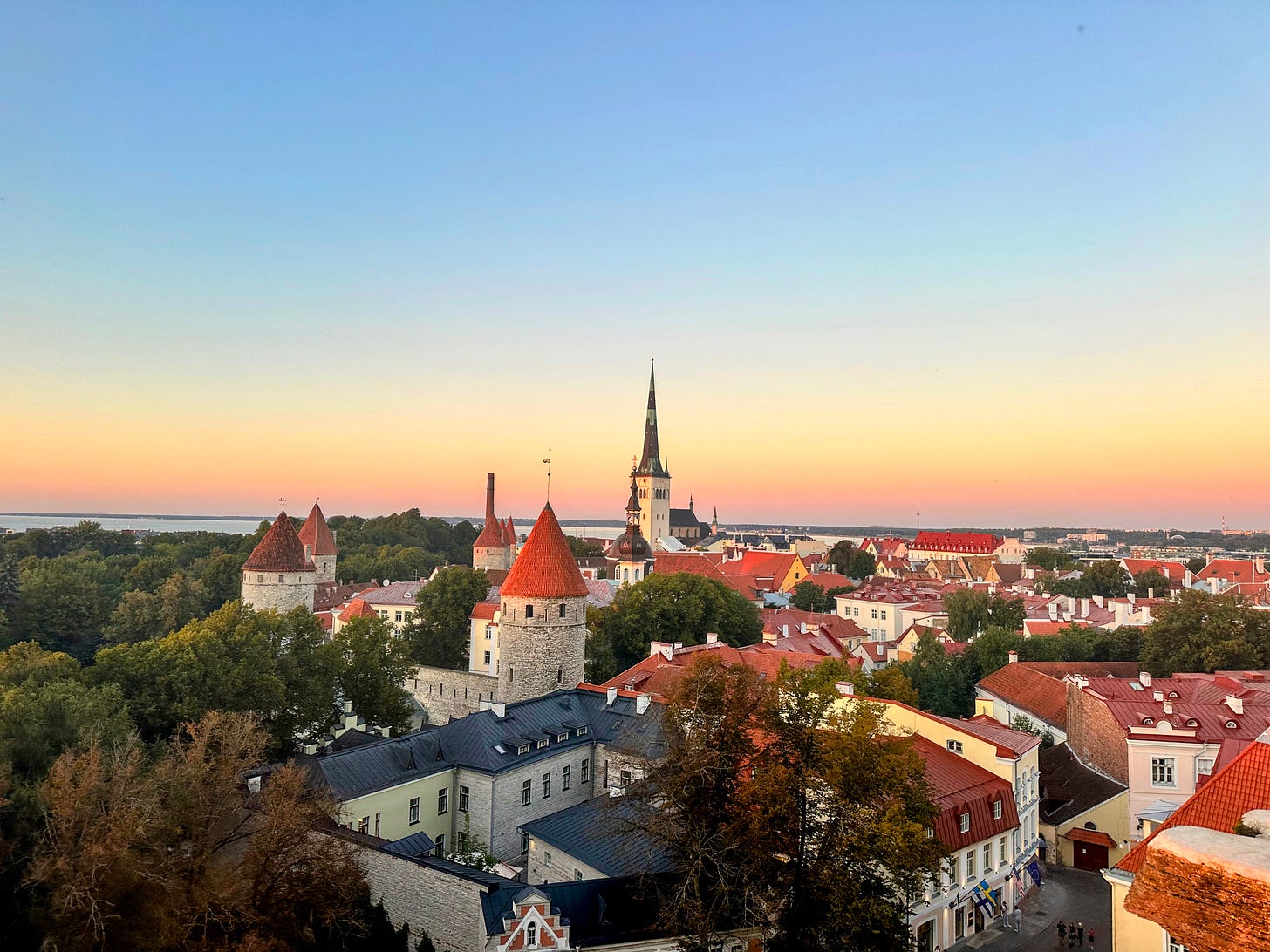London Isn’t Designed for Living
What if a city didn’t just exist to be lived in, but to be felt in your bones?
I’ve always been fascinated by cities, their energy, their pace, their sense of belonging -or lack thereof. Born in India, I spent my childhood in noisy, colourful rickshaws on the way to school, but it was London that shaped my adult identity. Yet, it wasn’t until I lived in Tallinn that I realized just how much I had taken the chaotic pulse of London for granted - and how much a city could affect your soul.
In Tallinn, a simple walk to the bakery felt like an escape, where the quiet streets and crisp air gave me the space to think. In London, even a walk to the corner shop is a marathon, with crowds, honking cars, and the constant hum of a city that never truly sleeps. The contrast was jarring. Tallinn’s serenity felt like a balm, while London’s hustle left me breathless. I found myself asking: which one truly nourished my well-being?
Tallinn taught me simplicity. It’s everything Sadiq Khan is trying to do with his 15-minute city concept but without the growing pains. Imagine a city where almost everything is within walking distance: groceries, sports facilities, schools, and even green spaces. It’s not just a promise, it’s reality. Tallinn fosters connection, efficiency, and calm. Its design promotes community, with pedestrian-friendly streets, local businesses, and spaces that encourage reflection. It was a city built for slowing down, for being present.
But while Tallinn’s simplicity felt like a breath of fresh air, London’s complexity made me realize just how much I’d come to depend on the convenience and energy of a larger city. London, in comparison, is chaos - beautiful, vibrant chaos. It’s easy to fall in love with its endless opportunities, its cultural richness, and the feeling that something exciting could be around every corner. But it’s also exhausting. It demands your attention constantly, but doesn’t always give back the sense of belonging that Tallinn did. In London, it’s easy to feel invisible in the crowd, like you're always running towards something that’s just out of reach.
Since returning to London, things that never bothered me before now feel like burdens because I know it doesn’t have to be this way. It shouldn’t take me an hour to get access to a good gym, and seeing friends on the other side of London shouldn’t feel like maintaining a long-distance relationship. Life feels harder, shorter and more fragmented.
The Rise of the Multi-Hub City
Living in Tallinn gave me a glimpse of what the future of urban planning could look like. The city's 2035 Mobility Plans aim to decentralize the city centre, creating vibrant local hubs connected by fast, efficient public transport. In Tallinn, this isn’t just a concept; it’s already happening. It’s not only about convenience; it’s about building a city where people don’t just exist in a place but belong to it.
Why is this important? For one, it ensures a more equitable quality of life. Whether you live near the historic Old Town or in a more suburban district, you’re never too far from essential services or green spaces. It prioritizes walkability, and accessibility, and reduces car dependency (which is great passenger-princesses like me). And while this is easier to implement in a city with just over 400,000 residents, the idea of multi-hub cities could be something to think about for larger, more complex metropolises, like London.
In London, though a multi-hub city, the design leaves much to be desired. It consists of a sprawling network of neighbourhoods, each with its character and culture, but they often feel disconnected. The sprawling nature of the city means that even the most vibrant parts of London can sometimes feel isolated from each other. Take cycling, for example. In places like Hackney, it’s a dream, but getting to Ilford means dodging traffic and navigating busy roads. The benefits of accessibility and safety don’t extend equally across the city, which creates a sense of fragmentation.
Living in a city with distinct, isolated hubs makes it hard to feel truly grounded. The multi-hub dream is not just about reducing congestion—it’s about creating spaces where you can feel rooted, no matter where you are. It’s about knowing that no matter where you are, you’re part of something that connects, nurtures, and nourishes you.
Lessons From Both Worlds
My favourite part about living in Tallinn was the lack of thought I had to put into my daily commute. Everything I needed was within walking distance. If something was a little further away, a quick Bolt ride would take me there. Removing the stress of long commutes and setbacks freed up so much mental energy. For once, I wasn’t rushing to be anywhere. I had time to just be—to enjoy the small, unhurried moments that were woven into my day. Tallinn, in its simplicity, gave me more than convenience; it gave me time to breathe, to pause, and to appreciate the quieter rhythms of life. It was like being gently pulled into a slower, more deliberate version of myself.
London has its merits too. It’s a cultural and economic powerhouse, offering everything from food from every corner of the globe to career prospects that can change your life. But, for me, the constant rush, the crowds, and the noise are a turn-off. The energy is always on the move, but it’s not always the energy that feeds my soul.
What If Cities Focused More on Soul Than Size?
What if cities didn’t measure success by their size or ambition, but by how well they nurtured the soul of their residents? How might we balance the simplicity of walkable spaces with the boldness of global hubs? Maybe the future of cities isn’t about choosing between ambition and intimacy but about finding a way to merge them—to create spaces where our dreams are big, but so are our moments of stillness.
Until that city exists, I’ll keep dreaming.
Based on this, is there a city you think I will enjoy a lot? Please let me know in the comments!





Ahh another essay I love! I knew nothing about Tallinn, now I’m fascinated to visit someday. I lived in Lisbon for a while and felt this same sense of wishing I could mould London to mimic some things: the outdoor culture, the proximity of all my friends there. Your writing ties together so much that interests me - the emotional experience of living in certain spaces, the loneliness of London life, lessons from other areas!